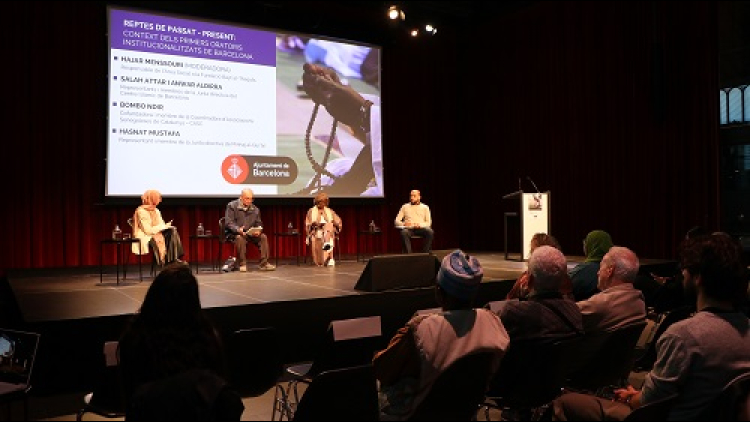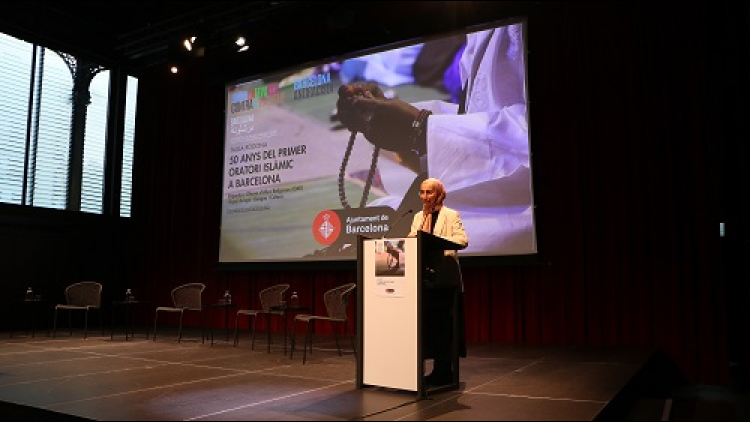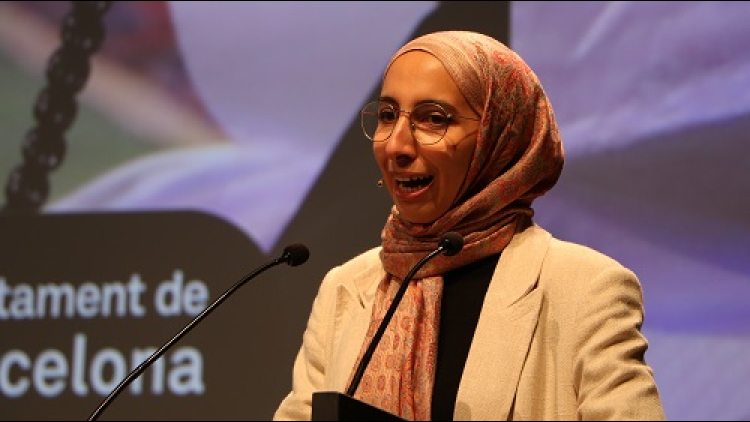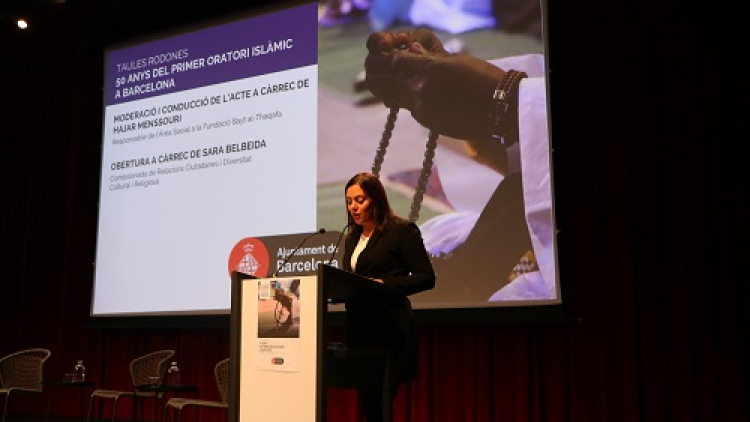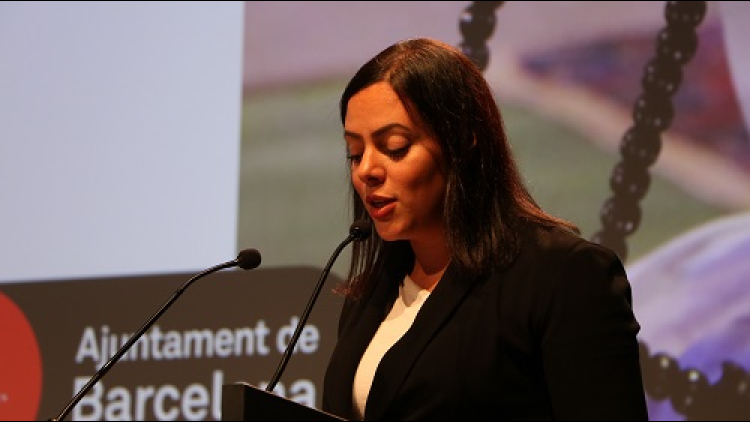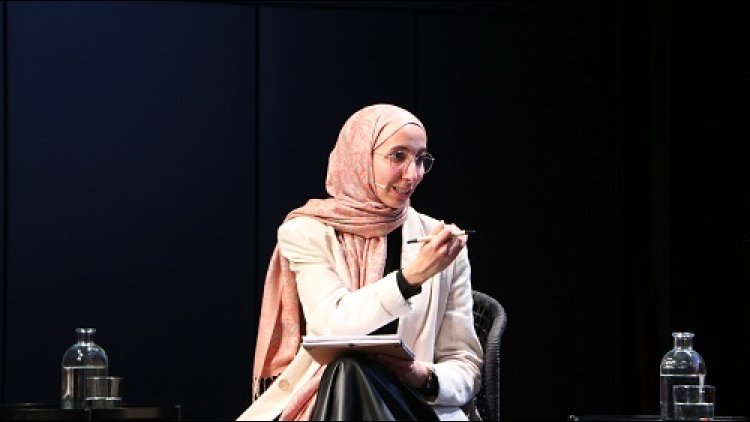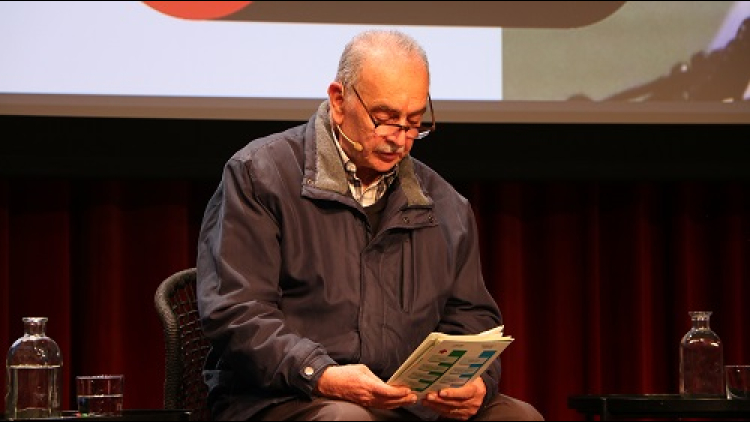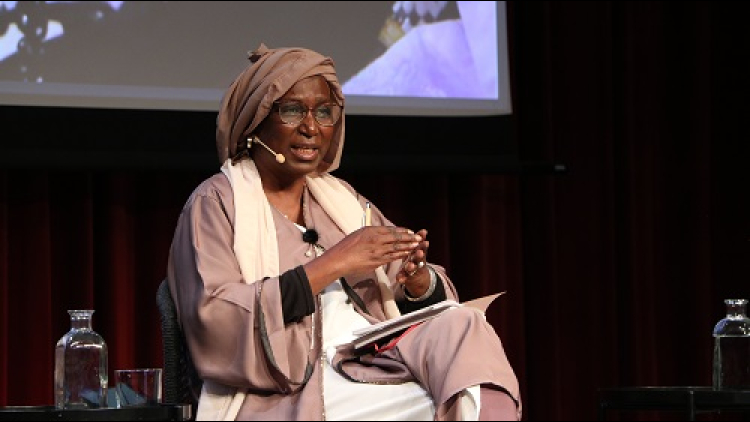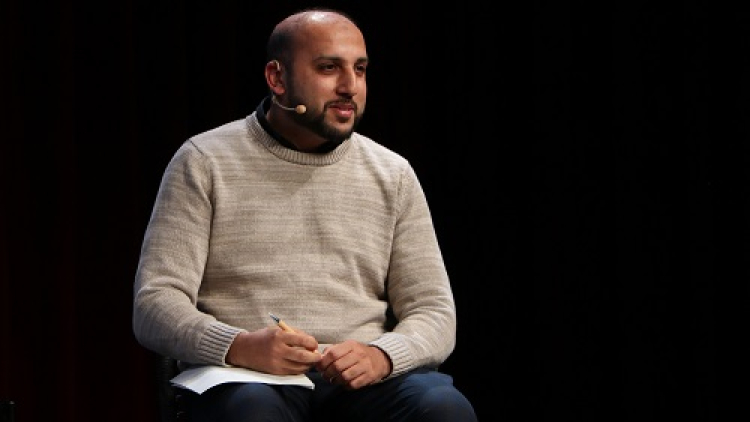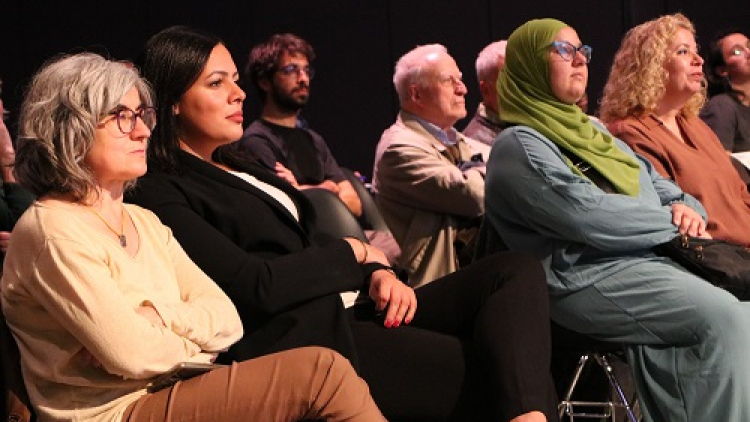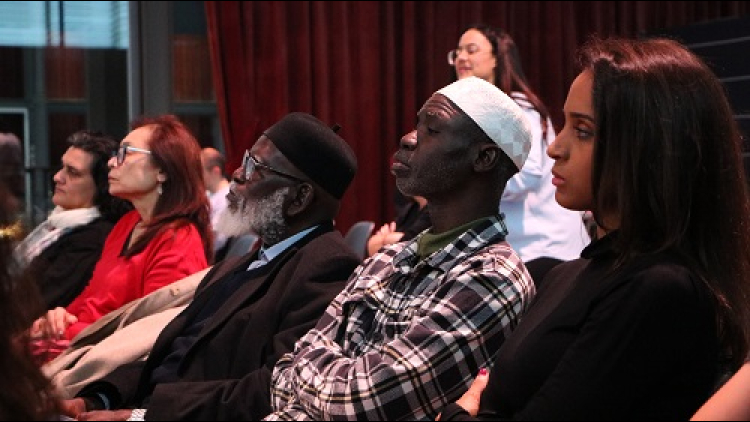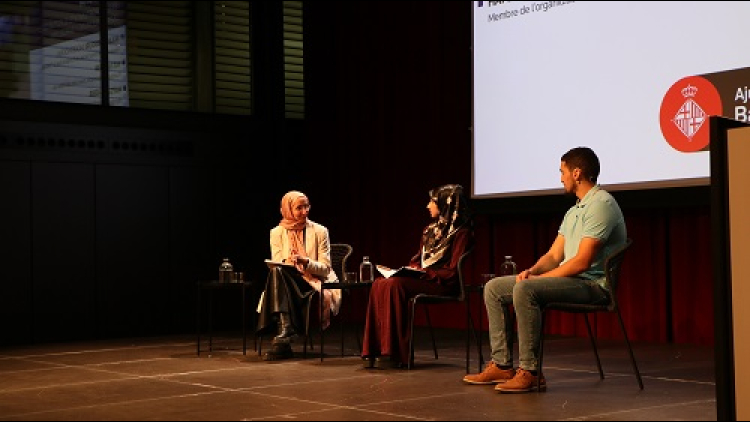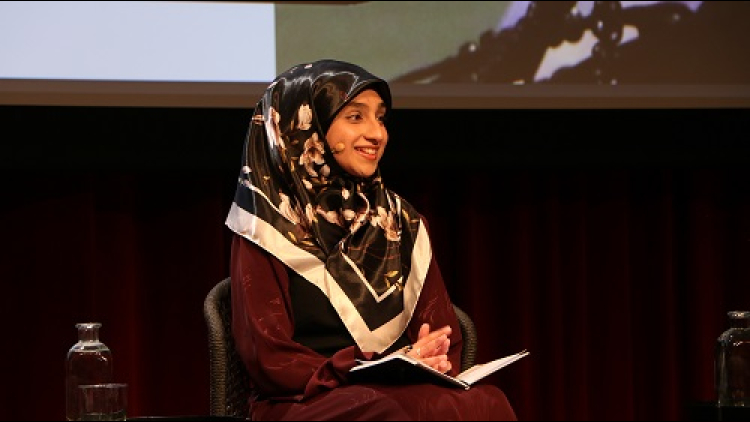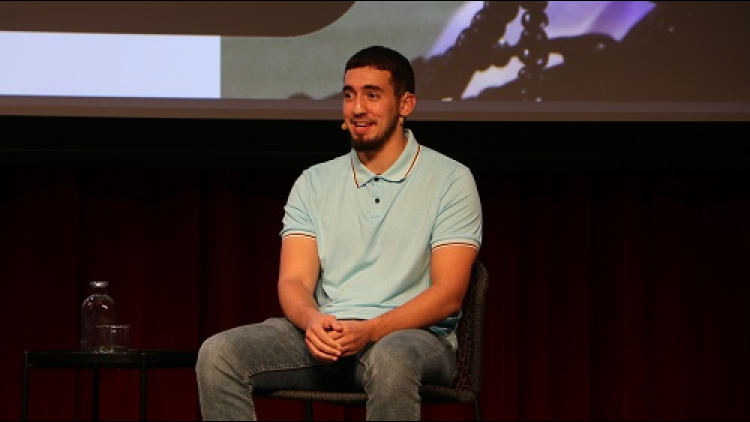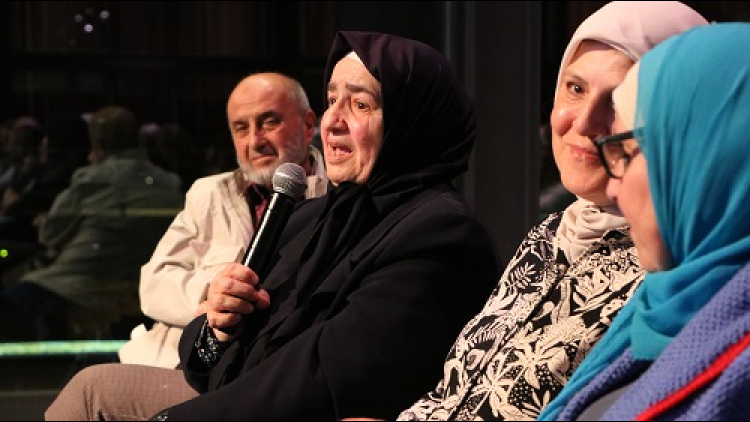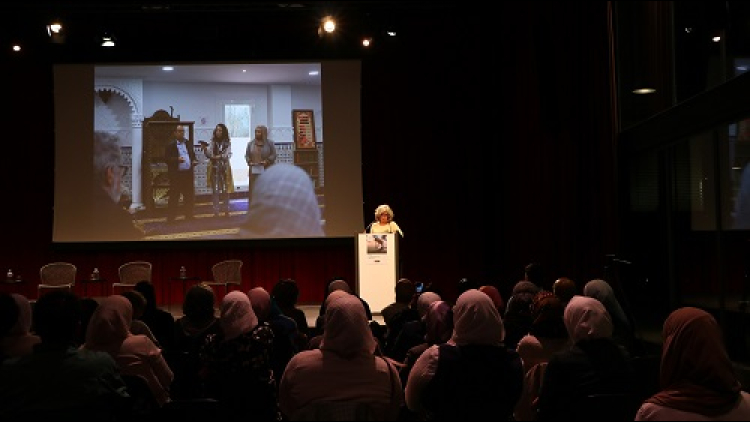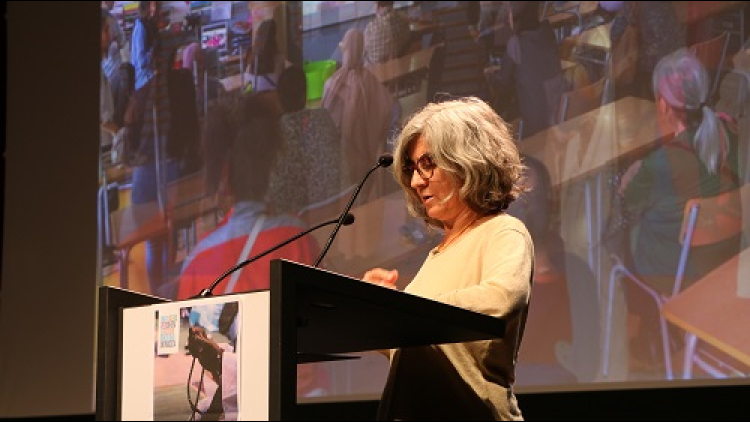ISLAM | #Barxiluna ‘Fifty years ago, we needed a place to meet and share’, Anwar Aldirra
The activity ‘50 Years of the First Islamic Centre in Barcelona’ was the last of the activities started in 2022 as part of ‘Barxiluna برشلونة: (Dis)memory of the Islamic Past and Present’, co-organised by the Office for Religious Affairs (OAR) and the Espai Avinyó. It consisted of two panel discussions to commemorate the fiftieth anniversary of the Barcelona Islamic Centre, the first institutionally recognised Muslim prayer centre in Barcelona, and to reflect on the past, present and future of the city's Islamic community. The activity was held on 15 November at the Born Centre of Culture and Memory.
The Barcelona Islamic Centre was founded in 1974; it is the leading place of Muslim workshop in Catalonia that is institutionally recognised and still operating today. To celebrate this milestone, on 15 November the Office for Religious Affairs (OAR) and Espai Avinyó organised the activity called ‘50 Years of the First Islamic Prayer Centre in Barcelona’.
This session commemorated not only the fiftieth anniversary of the Barcelona Islamic Centre but also three significant spaces or times. The first was the conclusion of the line of activities ‘Barxiluna برشلونة: (Dis)memory of the Islamic Past and Present’, a series co-organised by the OAR and the Espai Avinyó which consisted of a series of activities that spotlighted and reflected on the past, present and future presence of the Muslim community in Barcelona. The second one, ‘50 Years of the First Islamic Prayer Centre in Barcelona’, was part of a series of parallel activities entitled ‘Voices against racism’ which the Barcelona City Council has promoted on the occasion of the 4th UNESCO Global Forum against Racism and Discrimination, which will be held in Barcelona on 9, 10 and 11 December 2024. Finally, the two panel discussions that were part of the activity were held at El Born Culture and Memory Centre, a space which bears witness to the city’s Islamic past, given that a Muslim necropolis dating from the year 1100 was discovered in front of the centre.
‘50 Years of the First Islamic Prayer Centre in Barcelona’ was a ‘day of both commemoration and recognition of many people’s struggles, which the second generation is taking up to continue working to contribute to and build society’, said the moderator of the session, Hajar Menssouri. The activity began with a speech in which Sara Belbeida Bedoui, Barcelona City Council’s Commissioner for Citizen Relations and Cultural and Religious Diversity, congratulated the prayer centre on its fiftieth anniversary: ‘it is not only a place of worship and spiritual fellowship but also a symbol of peace coexistence and diversity’. The many diverse Muslim organisations and associations in Barcelona and Catalonia also claim the same, like the Union of Islamic Communities of Catalonia (UCIDCAT), the Islamic Federation of Catalonia and the Catalan Federation of Pakistani Organisations, which have long been working to ‘promote dialogue and social cohesion’.
In the first panel discussion, three representatives of the Muslim communities of Barcelona shared with the audience the origins of their organisations and the past and present challenges they face in conducting their activities. First, Anwar Aldirra, a member of the Barcelona Islamic Centre (Sant Andreu), shared the story of the founding of this centre, which was only possible thanks to the efforts of a group of Syrian students, including himself, who came to the city in the 1960s and 1970s to pursue university degrees that were not available in their home country. ‘At first the space was used for Friday prayer, but we soon began to organise cultural, leisure and athletic activities’, he said. ‘We needed a place where we could meet and share our worry and nostalgia from being far from our families and country’. Finding and legalising a place was a very difficult feat, but so was forging good relationships with our neighbours and economically sustaining the centre: ‘Today the centre still receives no type of assistance other than the donations from its attendees’. However, this has not stopped it from fulfilling its mission. Today it not only welcomes Muslims from all backgrounds but also has contacts and relations with non-Islamic communities in the Sant Andreu neighbourhood, which they hope ‘benefit the neighbourhood’.
After Aldirra, the next to speak was Bombo Ndir, a human rights activist and member of the Coordinator for Senegalese Associations of Catalonia (CASC) (Ciutat Vella), who continued to discuss the social dimension of religious organisations, this time from the standpoint of the community of Senegalese Muslim women. This diaspora reached Catalonia following the path left by their ‘Arab sisters, who came first and paved the way for other African communities to organise’. This made it possible for organisations like the CASC to be founded, which currently encompasses 79 Senegalese associations. Ndir stressed the role of women in mosques to exemplify Islam’s tendency towards cohesion, which comes into play in these communities: ‘Our role is to be caregivers, so going to the mosque means caring for the family, although we also teach and educate’. Thus, women are often in charge of coordinating charitable fund-raisers held at the centres, and they play an important role in ‘connecting and supporting the entire community, because mosques are gathering points’. This is why the CASC is committed to participation and dialogue: ‘We work on peaceful coexistence and intercultural mediation because our neighbours are our brothers and sisters and we have to care for them’.
The first panel discussion closed with Hasnat Mustafa, from the Minhaj al-Qur’ân community, a Pakistani organisation that has also promoted social cohesion since it was founded. This community began to grow in Barcelona in the early 1990s, but they needed their own centre because of the language barrier at the existing mosques, where the majority of participants came from North Africa or the Middle East. Thus, in 1997 the first centre of the Minhaj al-Qur’ân association was founded on Carrer l’Arc del Teatre (Ciutat Vella), which signalled a turning point for the community. ‘When you immigrate, you want your children to learn about your culture and language and to read the Quran. The mosque plays this role.’ Shortly thereafter, the association opened its second centre on Carrer d’Erasme de Janer (Ciutat Vella). Even though it was not exactly welcomed by the neighbourhood residents, today it holds activities for the entire neighbourhood. ‘We began to partner with the local Catholic church, work on interfaith dialogue and hold open doors. We want to let people get to know us, and we want to learn about the culture here’, said Mustafa. ‘The mosque is not only a place of worship; it’s also a civic centre and a place of gathering, where anyone can share their problems with the community’.
This tendency towards cohesion and dialogue based on recognition of one’s own identity is the testimony taken by the new generations of Muslim immigrants and the topic of the second panel discussion in this activity. In this part, Hatim Azahri, president of Joves Units del Poble-Sec, and Hafsa Shabbir, member of the Minhaj al-Qur’ân association, talked about the reality and challenges of day-to-day life for young people who have grown up in the centres and mosques that the first generations struggled to create.
In Shabbir’s opinion, the challenges that young Muslim women raised in Catalonia encounter are related to their identity and public life: ‘I was born here, but my parents immigrated here from Pakistan. I have a dual identity which is very difficult to handle in day-to-day life, especially in terms of preserving our religious identity’. The clearest example is the difficulty wearing the hijab or Muslim veil in some situations, but she also stressed the lack of Muslim places of worship and cemeteries, the latter an issue which is particularly worrisome for Muslims who have made their lives in Catalonia. Keeping up this religious identity is difficult primarily because of a lack of knowledge, ‘promoted in part by the media’, which Minhaj al-Qur’ân attempts to alleviate by ‘acting as a bridge between the Muslim community, society and public organisations’.
The way Joves Units del Poble-Sec deals with this lack of knowledge is less mediation and more reappropriation of public space. ‘The association was founded in 2019 with the goal of improving our environment based on accurate representation of our neighbourhood, where 50% of the residents come from elsewhere’, he said. ‘We want to empower young people from diverse backgrounds to participate in the neighbourhood as citizens with rights and duties in order to improve our environs’. The speaker believes that participation and mobilisation are key tools in improving one’s environment, because ‘politically, no one listens and no work is done if there is no social movement behind it’. Islam has a lot to say about this, he said, as ‘a religion that encourages us to get organised and mobilise on behalf of justice’, because ultimately, young people like him are ‘Muslims, but also citizens of Morocco and Poble-Sec, and we want to care for the place that has welcomed us’.
In this act of communicating, listening and caring, Barcelona’s different Islamic centres make dissemination efforts, which Shabbir believes is essential for mutual understanding, justice and peaceful coexistence: ‘We have to open the doors to non-Muslims so they can come here, ask questions and learn about the religion and the community’. This is why Minhaj al-Qur’ân focuses on ‘fostering the ideas of peace, love, tolerance and community’. Azahri concurs, so the goal is to break down imposed barriers, take advantage of people’s curiosity and ‘make this effort to take a step towards understanding’. Both panel discussions offered reflections on how even though some of the difficulties that the first Muslims communities in Barcelona faced when conducting their activities still exist today, so does their spirit of struggle and harmony as the new generations have taken the reins.
The activity ‘50 Years of the First Islamic Centre in Barcelona’ closed with a speech by Núria Serra, Director of the Barcelona City Council’s Department of Interculturality and Religious Pluralism. Serra looked back at all the activities in ‘Barxiluna برشلونة: (Dis)memory of the Islamic Past and Present’, which has offered a multidimensional picture of the historic and recent past, the present and the future of the city’s Muslim community. She highlighted the importance of these activities for Barcelona, because ‘many issues have arisen throughout the activities, and we should roll up our sleeves and continue working to shed light on the different problems that Barcelona’s Muslim community is facing.
This activity was complemented by the ‘Prayer Centres’ route on 9 November, which visited four Islamic centres in Barcelona: the Karam ilâhî Islamic Centre, the Nou Barris Islamic Community, the Al-Hudâ Mosque – Association of African Muslims of Barcelona and the Barcelona Islamic Centre.

